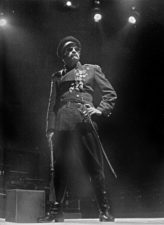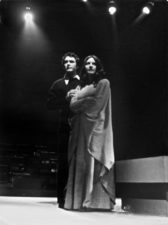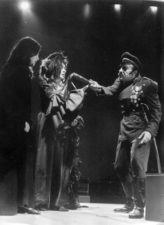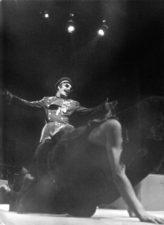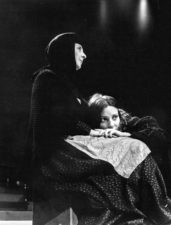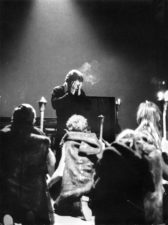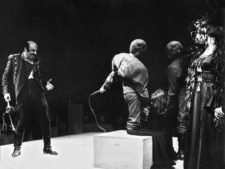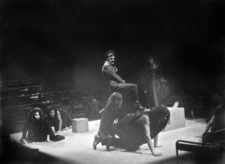Modern theatre
The new trends of modern theater, though they have their roots and early seeds in Jarry, Büchner, Pirandello, Strindberg, were nevertheless born and blossomed in the post-war years. It is the experience of violence. The cruelty of survival. The consciousness of the existential dimension of man, in a world unreasonable and hostile. Stripped of illusions, gods and values. Our era is a time of internal alienation. And theater could only demonstrate man being alienated, through new aesthetic forms and new pursuits. It is the theater of Ionesco that establishes the "Theater of the Absurd" of non-communication and the irrationality of human existence. He states: “Theater is a farce. We have to fill it with parody. Humour. With a lot of comedy. Without subtlety, to the point of frenzy. They are the sources of tragedy. A theater of violence. Yes, a violent comedy. Violently dramatic".It is Antonin Artaud's "Theater of Cruelty" whose revolutionary poetry stems not only from "reason" but from the sum of theatrical creation. And it draws us to our metaphysical roots and this "sense of chaos", which calls into question all relationships between things and their significance. It is the theater of Samuel Beckett embarking from the "guilt of existence" which will convey all the tragedy and solitude of human existence, within the dimensions of denial and metaphysical void by "mocking" it's own anxiety. It is the theater of Pinter and Albee, who will violently strip the human soul, not only to devour its humanity but also to eradicate the remaining light that lingers after destruction. Theater is an extension of life. And our time, "more tragic now than ever" (as Albert Camus once said in a lecture in Athens), could only give birth to the new aesthetic vision of the world. And the modern man, trapped in his loneliness, his terror, his desperate quest for liberation, could only, through the essence of his own suffering, express his era and tragic fate.
Our generation
Our generation, as children of the postwar years, has lived through the cruel atrocities of World War II. And what we inherited, what we found, was nothing but ruined values, wounds, ruins full of mass murder, a hard struggle to survive. Through these difficulties, as children, we began to find our own face, our own voice, our own values. I believe that our generation firmly carves its path, its face, its spiritual horizons, in all areas of creation in our country. This era has given us a new inner dimension. A new sense and vision of the world. We need to find ways to exist and express ourselves in it. Not because aesthetic values have changed. It's because our sensitivity to them did.
About "Electra's dance"
I believe that nothing ends in any season. Seasons differentiate truths. They express them through their own tragedy. I tried to give an anti-Electra, faced with the "legacy" of hate and the historical "debt" of crime. Orestes and Electra are both innocent, burdened by their murderous history. It traps them as an inevitable fate. And just as they realize their innocence, internal torture begins. If there is a concept of "tragic" in this theatrical form of "anti-tragedy", it is, I think, the moment when any historical debt of crime is confronted with the innocence of man and his enslaved will to necessity. And yet, it is courageous, this nostalgia of the impossible, that makes faces "beautiful", in the despair of irrational expectation. And they do not become murderers of their mother, not by accidental delay, as it appears in the play, but because they follow their own path to the inner light that directs them. People who have suffered the devastation and wounds of war know that killing for whatever reason is unworthy. My heroes (the anti-heroes), tired of this history of hatred, have crumbled beneath their inner light. And they stand up not only against the debt of murder they must commit but to fate itself, to this necessity of crime. And the moral value of "revenge" killing (as it was in ancient tragedy) shifts to non-value, shifts to innocence, a vision of human love. I don't know if I was able to convey to the viewer what I was trying to do. This will be judged by others. The viewer will judge it himself.
μ.λ.π. από το πρόγραμμα του θεατρικού
Reviews, studies
Ο χορός της Ηλέκτρας”, κριτική μελέτη για το έργο από την καθηγήτρια Αφροδίτη Σιβετίδου
Archives
Electra's Dance was staged at the New Stage of The National Theatre in November 1971. (Link to the N.T. archive)
PRODUCERS
Direction: Labros Kostopoulos Scenography: Dionysis Photopoulos Costumer: Dionysis Photopoulos Composer: Stavros Xarhakos
CAST
Aegisthus: Vasilis Kanakis, Clytemnestra: Theano Ioannidou, Electra: Niki Triandaphyllidi, Pylades: Stelios Kalogeropoulos, handmaid: Anna Paetazi, Guards: Dimitris Kontogiannis, Dimitris Dounakis, Andreas Papadopoulos, Spyros Loukas, Servant: George Karettas, Old men: Kostas Kokkakis, Christos Konstantopoulos, Pelides: Kostas Fragopoulos, Archer: Kostas Sapountzidakis, Orestes: Nicephorus Naneris, Men: Christos Konstantopoulos, Kostas Kagxidis, Kostas Galanakis, Danis Katranidis, Women: Niki Vorea, Electra Konstantinou, Mata Michalarea


